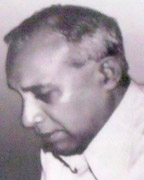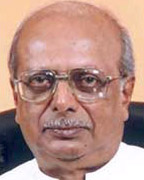|
Best tribute to Prof. Senaka Bibile:
Quality medicines in State and private hospitals
by Prof. Tissa Vitarana
Senaka Bibile was born on February 13, 1920, the son of the Ratte
Mahaththaya of Bibile, and grew up in a privileged environment, but was
deeply affected by the poverty around him in the Moneragala district.
 |
|
A variety of medicines
available in the market |
After his education at Trinity College, Kandy (1928-1939), he entered
the Medical College of the University of Ceylon in Colombo from 1940 to
1945, where he excelled, obtaining a First Class at the final MBBS, with
distinctions and gold medals for Medicine and Surgery. But rather than
earning money in one of these lucrative fields, he opted to do research
and teaching, and joined the Faculty of Medicine, University of Ceylon
as a Lecturer in Pharmacology. Typically, he repaid his scholarship
funds so that another student would benefit.
After completing his PhD in Edinburgh, he became the first Professor
of Pharmacology in Sri Lanka, in 1958. In 1962 he moved to Peradeniya
where he established the Pharmacology Department, and played an
innovative role as the Dean of the Medical Faculty, from 1967-70, giving
it a unique character. He was popular with both students and staff. He
was an excellent lecturer who often spoke without notes.
But he is best known and remembered for his pharmaceutical reforms,
which had a global impact. He established the State Pharmaceutical
Corporation (SPC) in September 1971 and became its first Chairman. After
the Lanka Sama Samaja Party (LSSP) was thrown out of the Coalition
Government in 1975, lacking the support required to carry forward his
reforms, he left the SPC. He joined UNCTAD as a Senior Advisor and
Consultant on Pharmaceutical Policy in March 1977.
This great visionary was my teacher, my friend, my fellow medical
scientist and researcher, and most of all, my comrade in the Socialist
party, the Lanka Sama Samaja Party. It was this broad scientific
socialist outlook and commitment that was at the root of his
revolutionary drug reforms. His commitment was evident when he agreed to
contest an ugly Municipal by-election, for Kuppiawatte, at the height of
the language crisis, at the request of the Party. It was this fighting
spirit that enabled him to face and fight the might of the TNCs, to
carry through his drug reforms.
But they eventually got him. He died under very suspicious
circumstances (was killed, in my opinion) on September 29, 1977 in
Guyana, while on a mission to introduce his drug reforms, for UNCTAD.
But they could not kill his ideas which are being implemented
successfully in many Third World countries, like Bangladesh, though
unfortunately, not properly in Sri Lanka.
Senaka Bibile’s legacy
|

Prof. Senaka Bibile |
|

Prof. Tissa Vitarana |
The aim of Senaka Bibile’s pharmaceutical policy could be summarised
as follows: “Effective safe medicines for all. Affordable to those able
to pay, free for those who cannot”. What has prevented this very
desirable policy being achieved?
1. Sri Lanka is part of an international market for pharmaceuticals.
In the 1970s, this market was dominated by the Transnational
Corporations (TNCs or MNCs).
Seventy percent of this market was controlled by a few huge drug
companies or TNCs from just six countries (USA, UK, France, Germany,
Switzerland and Japan). Since then, Indian drug giants such as CIPLA and
Ranbaxy have also come up and in countries such as Sri Lanka, they are
directly supplying the market and tending to play a similar dominating
role.
2.The financial strength of these TNC pharmaceutical companies is
evident from their revenue in 2012.
3. Among global industries, the pharmaceutical industry is only
second to the armaments industry in size, profits and power, both
financial and political. The current attempt by the US Congress to shoot
down Obama’s health care proposals is a case in point.
4. Promotion of brand names as against generic names of medicines.
Every pharmaceutical preparation or drug has only one scientific or
generic name e.g. Paracetamol. But the different pharmaceutical
manufacturers can produce and sell it under several brand names e.g.
Panadol, Calpol etc. Sometimes 20 or more products.
But there are companies that produce one generic product alone at
well below the price of brand products. According to the USA Food and
Drug Authority (FDA), “on average the cost of a generic drug is 80 to 85
percent lower than the brand name product. In 2010 alone, the use of
FDA-approved generics (in the USA) saved $ 158 billion.”
5. A comparison of the current price of a few commonly used generic
drugs in the Sri Lankan market with the highest price branded product
(within brackets) gives an idea of the difference in price .
6. How do TNC drug companies make huge profits?
(a) Retaining monopoly control of the generic product that they
develop by obtaining a product patent from the Government Patent Office.
This is sold under a variety of brand names, and by claiming that these
are more effective and safe, boost the prices as indicated above. But
this claim is not justified. For example, “in 1966 the Deputy
Commissioner of the FDA,USA, declared that 7.8 percent of generic drugs
and 8.8 percent of branded drugs were not up to acceptable potency”
(quoted by Prof. Colvin Guneratne).
(b) Boost brand names through advertisements and promotions among
doctors, pharmacies, hospital managers and government administrators,
policy makers and drug regulators.
(c) Through misinformation and perks, influence doctors to prescribe,
pharmacists to sell, and regulators and administrators to register and
promote more expensive brands.
Senaka Bibile reforms
What Senaka Bibile achieved can be summarised as follows:
He showed that there were innumerable brands of a particular medicine
imported into Sri Lanka and that the more expensive ones dominated the
market. For example, there were 23 brands of tetracycline. What Senaka
achieved was to ensure that only one generic tetracycline of good
quality was imported to Sri Lanka at the lowest price.
He did the same for all other medicines and in 1972 there was an
overall saving of more than 40 percent in the drug import bill to the
country. All the low cost essential medicines were available throughout
the year in government hospitals and in private pharmacies. By insisting
on certificates of good manufacturing practice and regular sample
testing, he ensured their quality. Every patient got the medicines he
needed at all times.
How did Senaka Bibile achieve this?
Senaka Bibile and Dr. S.A. Wickremasinghe presented a detailed report
of their proposals to the Prime Minister Sirimavo Bandaranaike. What he
did follows:
(1) Established the State Pharmaceuticals Corporation (SPC) in 1971.
All imports of drugs to Sri Lanka (for both public and private sectors)
were by the SPC. After estimating our national requirements, the SPC
called for bulk tenders worldwide on the basis of generic names, so that
TNCs were forced to compete with each other and also with producers of
generic drugs. The immense benefit to the country can be seen through
this example of the purchase of our requirement of Diazepam.
The TNC of Switzerland, reduced the price of their Valium from 91
cents per tablet to 51 cents. But Ranbaxy of India offered Diazepam at 2
cents per tablet. After obtaining Certificates of Good Manufacturing
Practice (CGMP), and getting adequate samples tested, to ensure the
quality, the SPC purchased the diazepam from Ranbaxy, with a great
saving to the country and the patient.
(2) While stressing the need for quality assurance, Senaka mooted the
need for a national laboratory that would ensure the quality of drugs.
The National Drug Quality Assurance Laboratory (NDQAL) was a later
outcome. Pending this, Senaka prevailed on Dr. H.R. Wickremasinghe, the
Pathologist at the General Hospital, Colombo to provide the services of
a quality control laboratory. He also ensured quality, by insisting on
CGMP when registering a drug supplier, and valid sample test reports at
registration, awarding tenders, and delivery, backed by random testing
of samples.
(3) Compiling an essential drug list to greatly reduce the number of
drugs imported to the country, particularly those that were of no real
benefit to patients. He proposed amending the patent to break the
monopoly control of the TNCs. Though it was not implemented, he
purchased drugs from the Eastern European communist countries that did
not observe patent rights. He insisted on replacing brand names by
generic names when tendering, prescribing and selling medicines.
(4) Senaka promoted the development of a local pharmaceutical
industry regulated by the Government and with a State institution to
compliment the activities of the SPC. This idea came into fruition later
with the establishment of the State Pharmaceutical Manufacturing
Corporation (SPMC). The importance of the SPMC is evident – it
manufactures and sells a 500mg amoxycillin capsule at Rs.1.85, while the
private brand product sells at Rs. 12.50.
(5) Senaka stressed the need to train pharmacists, for both the State
and private sectors, and the need for proper storage and distribution of
drugs.
Open economy and undermining of Bibile’s policies
Major changes included the progressive taking away of private sector
import of medicines from the SPC and handing it back to the private
importers. This enabled the TNCs once again to influence and even
control the sector, so that high cost brands have come to dominate the
market, and the import cost to the nation has also gone up (the private
sector import cost was less than the State sector during Senaka’s time,
but today while the State sector import bill is about Rs. 15 billion,
the private sector import bill exceeds Rs. 50 billion). The limitation
of the essential drug list no longer applies and over 13,000 brands are
now imported with many unsuitable combinations, as well as high priced
and poor quality medicines. The price control that was in place (c.i.f.
cost +65 percent) was also totally removed so that fancy prices are
charged.
But while the SPC continues to import for the State sector, it is
regrettable that the levels of honesty and efficiency of the Senaka
Bibile era is lacking today among some sections. Failure to order the
actual requirement for the State sector in time, and the lack of quality
control, leading to the rejection and destruction of poor quality
medicines, leads to perpetual shortages. The limited budget of the State
hospitals is exhausted on local purchase of high cost brands. This leads
to further shortages, forcing patients to take prescriptions to private
pharmacies for many of the medicines.
When the poor patients are unable to take the full course of medicine
due to lack of money, the illness persists, and drug resistance among
the infectious agents in the community arises. The need for more
expensive and more powerful antibiotics arises in the community
thereafter.
The SPMC ensured the regular manufacture and supply of over 50 of the
most commonly required medicines for the State sector, so that there
were no shortages, and by frequent testing, the quality was ensured. But
as the policy of the SPMC has been changed to one of generating a
profit, the SPMC is also selling to private pharmacies so that less is
available for the State sector.
Unlike in Senaka Bibile’s time, today’s situation can be summarised
as being one of “chronic shortages of medicines in the State health
sector aggravated by frequent quality failures, and unaffordable or poor
quality medicines in the private sector”.
Rectifying the situation
1. The National Medicinal Drug Policy, which is long overdue from the
legal draftsman, should be made public forthwith.
2. The establishment of an Autonomous Drug Regulatory Authority
(ADRA) with the necessary expertise answerable to the Minister of
Health. This body should regulate the purchase, supply and prescribing
of drugs in both the State and private sectors. It should regulate the
imports to both State and private sectors by a strict process of
registration of suppliers, with defaulters being blacklisted. Imports
should be restricted to generics from the essential drug list for the
State sector, and the private sector should be allowed in addition a
limited number of good quality branded drugs (say five), as in some
countries such as Australia.
3. In the registration of suppliers, Pre-qualification is essential
to ensure good quality, and I am happy that the SPC has issued a
newspaper notice a few days ago. It must insist on CGMP and adequate
testing of samples by the NDQAL or other accredited laboratories.
4. Import and Supply of drugs to the State health sector -
*The SPC must call for global tenders, strictly following documented
transparent procedures; give preference when purchasing to (a) the
SPMC,(b) Registered local manufacturers, (c) Global suppliers of generic
drugs, in that order; and adhere as far as possible to the Essential
Drug List.
* The SPC and SPMC having one Board of Management would maximise
coordination.
* The SPMC should serve the State health sector and Osu Salas, and not
profits.
5. A Confidential Inventory Control System (as in the Bibile era)
with an efficient computerised Drug Management Information System would
ensure timely supply of drugs to the State sector. The MSD must maintain
adequate buffer stocks with proper regional storage facilities.
6. Promote the local pharmaceutical industry (to meet national needs
and as an export industry, as Bangladesh has done). The SPMC can be
expanded, and branches should be established at suitable locations e.g.
in the proposed pharmaceutical manufacturing zone in Chilaw. These
measures would ensure that good quality low cost medicines are available
in the SPC and pharmacies at all times.
7. Take action to reduce the price of medicinal drugs - (a)
Re-introduce price control (b) Increase local manufacture (c)
Professional bodies (SLMA, GMOA) and Medical Faculties must ensure that
doctors use generic names when prescribing (d) Make it mandatory for
pharmacists to stock and offer the cheapest registered generic drugs to
the customers (e) The media should educate the public accordingly.
The best tribute to Senaka Bibile is to ensure that every patient
receives good quality medicines free for all illnesses in State
hospitals, and at affordable prices in the private sector. I am sure the
Minister of Health will do all he can to achieve this objective,
overcoming the many obstacles. We offer him all our support.
Excerpts from the Senaka Bibile memorial lecture delivered by
Minister Tissa Vitarana recently. |

